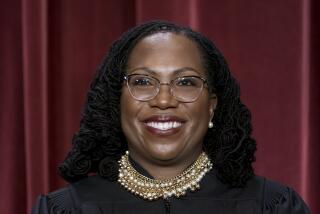Compares Them to Those Who Defended Slavery : Meese Assails Backers of Racial Quotas
- Share via
WASHINGTON — Atty. Gen. Edwin Meese III assailed advocates of racial quotas in hiring, admissions and promotions Tuesday, comparing them to those who defended slavery more than a century ago as “a kind of benevolence” for slaves and society.
“They will tell you that such policies are good not only for the recipient but for society,” Meese said in a speech to students and faculty members at Dickinson College in Carlisle, Pa.
Argument Rejected
“But you should not forget that an earlier generation of Americans heard from some that slavery was good not only for the slaves but for society. It was natural, they argued; it was a kind of benevolence. The people of America rejected that argument, and the vast majority of Americans today reject the idea that preferring some people for certain jobs because of their race or gender is right.”
The attorney general said that the Reagan Administration will continue to strongly enforce civil rights laws on behalf of individuals who have suffered discrimination--but could not support programs that favor one racial group over another.
“The idea that you can use discrimination in the form of racially preferential quotas, goals and set-asides makes no sense in principle,” he said. “In practice, it is nothing short of a legal, moral and constitutional tragedy.”
Meese did not name the specific targets of his unusually sharp remarks. But the speech was given in the wake of widespread criticism by civil rights and minority groups of reports that the Administration may revise a long-standing executive order and abolish a requirement that government contractors meet numerical hiring goals and timetables.
‘Separate but Equal’
In his speech, Meese noted that, despite adoption of the 13th, 14th and 15th amendments--the so-called “Civil War amendments”--the Supreme Court in 1896 still upheld “separate but equal” facilities for blacks and whites.
It was not until the school desegregation rulings by the justices in the 1950s that the doctrine was abandoned and the Constitution effectively became “color blind,” giving full meaning to equal protection of the law, he said.
Meese said that now, through race-conscious affirmative action plans, there is a new call for treating races differently.
“In recent weeks, as in recent years, there have been loud accusations that, because we advocate a policy of non-discrimination, this Administration is against affirmative action,” he said. “Nothing . . . could be further from the truth.”
‘Racially Neutral’
Meese said that the Administration will continue to adhere to the racially neutral “original understanding” of affirmative action, as advocated by the late Sen. Hubert H. Humphrey (D-Minn.), the late NAACP leader Roy Wilkins and former NAACP lawyer Thurgood Marshall, now a Supreme Court justice.
“The fact that discrimination occurred in the past provides no justification for engaging today in discriminatory conduct, even if the stated reason is to ‘undo’ past wrongs,” Meese said. The way to overcome discrimination, he said, “is to refuse to tolerate it in any form, at any time, for any reason.”
More to Read
Get the L.A. Times Politics newsletter
Deeply reported insights into legislation, politics and policy from Sacramento, Washington and beyond. In your inbox twice per week.
You may occasionally receive promotional content from the Los Angeles Times.










